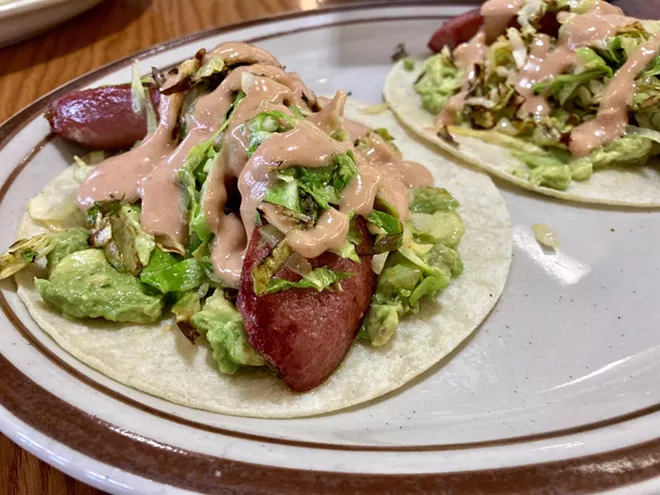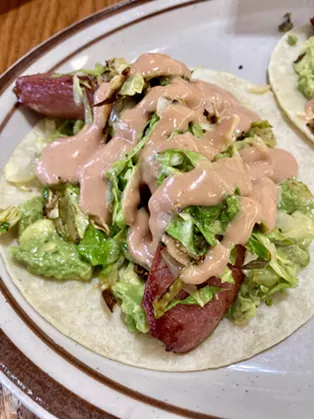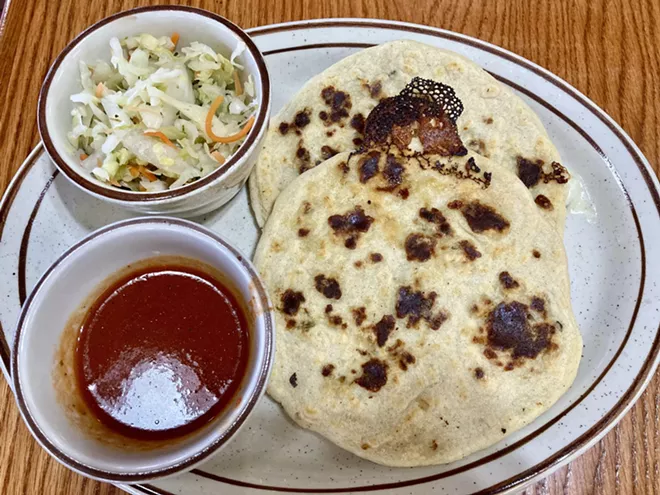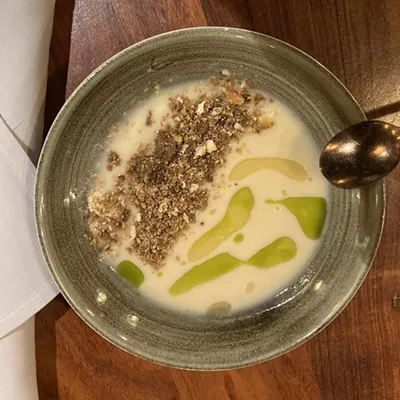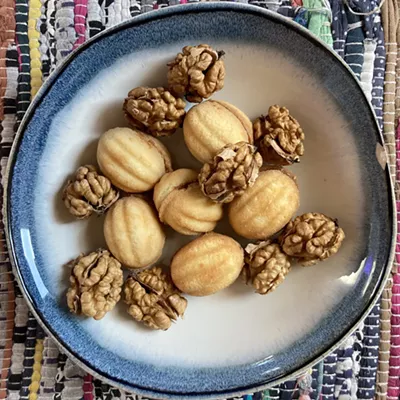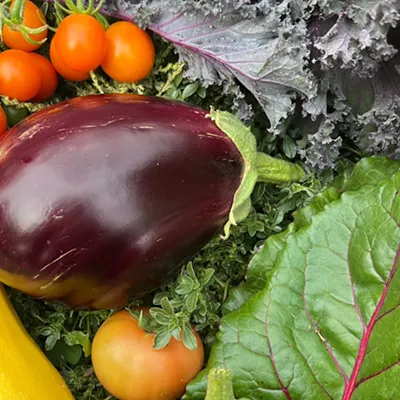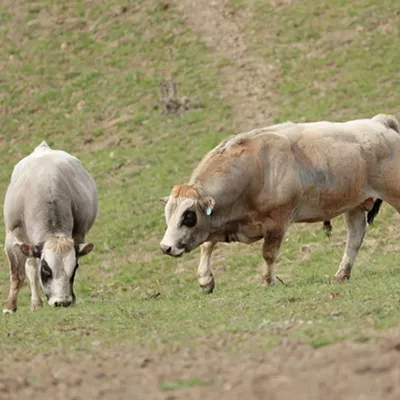This is an installment of the Inlander's yearlong project "Around the World in 80 Plates," a quest to find 80 foods and drinks in Spokane representing 80 different places. Read the introduction to the project here.
Count of dishes/places: 9
The Otis Restaurant still says "The Otis Grill" on the side, from all its years as a greasy spoon American diner just north of Liberty Lake. When the family-style restaurant closed in 2022, Otis Orchards lost a mainstay. But the doors didn't stay locked for long.
Mario Ruiz, previously the owner of Marandos in Spokane Valley, purchased, reopened and renamed the barn-shaped diner in the middle of 2023. He also updated the menu.
Ruiz is from Guatemala, and his wife, Belky Rizzo, is from El Salvador. When the couple took over the grill, they slowly started introducing some Central American dishes to the standard North American fare at their new restaurant. Apparently, it went over well. Without ditching favorites like onion rings or mozzarella sticks, the menu is now mostly Mexican, Guatemalan or Salvadoran.
Some items are fun fusion creations, like quesadilla bites and taco salad bowls. But others are tried and true Central American foods with long histories in their respective countries.
MIXTAS FROM GUATEMALA
Imagine running errands in Guatemala City. You get stuck behind buses of tourists headed to the Plaza Mayor, plus a rush of adventurers driving into the city after hiking Pacaya, the country's most popular (though still active) volcano. It's a pleasant 70 degrees Fahrenheit and you had an early lunch, so you make the best of the bad traffic and stop at the corner for a snack.
In Chicago , New York or Spokane, you might grab a hot dog from a friendly vendor in a silly hat. In Guatemala City, you'd grab a mixta, the perfect cross between a hot dog and a taco.
Instead of a bun, mixtas start with soft, fresh corn tortillas. Hot dogs in Guatemala are small, more the size of a breakfast sausage link. It gets wrapped in the tortilla, and then topped with avocado and lime-dressed cabbage. It's salty, creamy, tangy and perfectly portable, if you can manage to walk a few steps before gobbling down the whole thing.
The hot dogs in the U.S. are actually too big for mixtas, my server tells me, which is why they cut them in half at the Otis Restaurant. The chefs at Otis grill the dogs to give them a little extra char and saltiness. I thought the drizzle on top might be spicy, but it was actually just fry sauce — the super popular ketchup and mayo combo that adds that perfect touch of sweet and savory.
I love this hot-dog-taco-baby so much, I'm pretty sure I would walk around Guatemala City all day just to find and befriend mixtas vendors. Except now I don't have to — I can just drive to Otis Orchards. Or hike there, if I'm feeling really adventurous. Traffic would be bad, but at least there wouldn't be lava.
LOROCO PUPUSAS FROM EL SALVADOR
In San Salvador, an abuela walked through her neighborhood to a corner shop by an old church to buy pupusas. The stuffed tortillas were huge — as wide as a dinner plate, and just as thick. The old lady wasn't supposed to leave her house, but when no one else was home, she would persuade her grandson to break the rules with her.
"My grandma at the time was starting to develop Alzheimer's," says Rodrigo Chavez, a local Spokanite originally from El Salvador. "I was around 13 or 14. She used to go on walks, which was starting to be something that she wasn't supposed to do. But when my parents weren't around, she'd just be like, 'Let's go walking.' I'll never forget because for three weeks in a row, we went there every single day. She would wake up and she would say, 'I wanna go get some of those pupusas. Let's go there for lunch.'"
Chavez moved to the U.S. when he was 15, not so long after those three weeks of nonstop pupusas. He still craves them all the time.
Pupusas are the quintessential Salvadoran dish, bursting with nostalgia for anyone who spent a childhood in El Salvador. They start with corn flour, the same flour used to make tortillas, which in El Salvador are thicker and fluffier than their Mexican counterparts, Chavez says.
Traditionally, the corn flour is then stuffed with some combination of cheese, meat and beans, and rolled out so the filling is distributed evenly inside. It's grilled on a hot stove and served with curtido, a pickled cabbage relish, and salsa roja, a red dipping sauce that's much thinner and runnier than the chunky salsa most Americans are familiar with.
The result? A hot, crispy flatbread oozing with cheese topped with a bright, vinegary crunch and a quick hit of spice. It's best to eat it with your hands, Chavez says, and he also recommends mixing the salsa roja with the curtido to get the perfect bite every time.
"Pupusas in El Salvador are like Starbucks in Seattle," he says. "You find a pupusa place on almost every corner. To me, it means home. Any time I get a chance to go to El Salvador and visit, I literally have them every day."
Chavez had been contenting himself with pupusas from the frozen aisle at Costco ("If you're really craving them they're good for the craving," he says) but was left wanting more. He and his partner hopped on Food Finder Spokane, a Facebook page dedicated to all things food in the Inland Northwest, to ask if anyone knew of authentic pupusas in Eastern Washington.
"People started telling us about [Otis] Restaurant. And so, like, three days later, we went to check it out," Chavez says. "They were amazing."
Rizzo, the chef at Otis Restaurant, is Salvadoran, and brought her pupusa making skills to the States. Hers feature different combinations of cheese, beans, pork and zucchini, but also loroco, another Salvadoran specialty. Loroco is an edible, unopened flower that's often used like an herb to flavor dishes in El Salvador. Chavez likens the sweet, earthy flavor to a green bell pepper, though it doesn't have the same crunch. In pupusas, loroco adds a nuance to what would otherwise be just corn and cheese.

"It's easy to grow down in El Salvador," Chavez says. "You can make rice with it. People make scrambled eggs with it sometimes. If someone in the household knows how to make pupusas, they more than likely have a loroco plant in their backyard."
Chavez posted on Food Finder to share about the pupusas at Otis, and got dozens of comments from other Salvadorans back. Chavez wasn't expecting that kind of response.
"It was so cool to me to post on there and to see people like, 'Oh, I'm from El Salvador, too.' Or, 'I know someone from El Salvador,'" he says. "It's neat that there's probably a small community of people from El Salvador here that I didn't know about." ♦
Have an idea for what I should eat next? Wanna make me a favorite dish from your hometown? Send 80 Plates tips and ideas to elizab@inlander.com.

